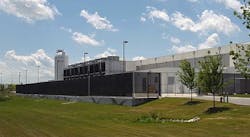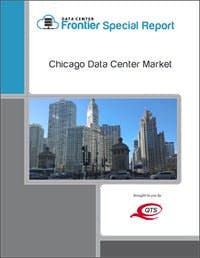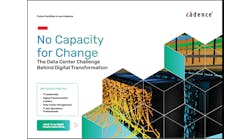The Suburban Chicago data center market is seeing an influx of new providers and supply, which positions the region for growth in the accelerating arms race to deploy IT capacity for cloud computing. Chicago is now one of the most active markets for new data center development, with more than 200 megawatts (MWs) of capacity either under construction or in the planning phases.
Two announcements this month are likely to bring additional large footprint data center facilities that can meet the super-sized needs of cloud computing providers.
- Digital Realty has acquired a former Motorola headquarters building in Franklin, Park, Illinois, according to local media. The deal positions Digital Realty for growth in the Suburban Chicago market near O’Hare Airport.
- T5 Data Centers has acquired a large facility in Elk Grove Village from Forsythe Data Centers, which will continue in place as the anchor tenant. In addition to powered shell space within the current facility, T5 says it can develop an additional 28 megawatts of data center capacity on adjacent land.
Leasing in the Chicago data center market was strong during 2015, with net absorption of 27 MW of capacity. This included several large deals from cloud computing providers, who are shifting to a build-to-suit model in which they pre-lease entire buildings for themselves, representing 12 megawatts or more of new capacity.
Data Center Frontier Special Report: The Chicago Data Center Market. Download It Now.
This robust leasing has prompted new construction in both of the region’s sub-markets: Downtown Chicago and Suburban Chicago.
The Downtown inventory consists of space in large, multi-tenant office buildings converted for data center use. Existing space can be particularly “sticky” with limited turnover due to the value of a Downtown presence in key verticals. As a result, the availability of large footprints is somewhat limited.
This is beginning to change with the construction of new data centers, including the QTS Chicago facility, which opened July 1 with approximately 2.0 MW (expandable to 8 MW) of commissioned power and 48,000 SF of commissioned data center space. The 317,000 square foot building will be supported by 24 MW of power when fully delivered. The sites under development by Ascent and 1547 Realty also have significant power capacity.
There’s also a data center building boom underway in the suburbs, where large data center REITs—Digital Realty, DuPont Fabros and CyrusOne—all plan significant expansions:
- Digital Realty has filled two data center buildings at its Digital Chicago development, representing about 27 MW of capacity. It is currently building a third data center that will accommodate 12.8 MW of commissioned power. The Motorola site will add additional capacity.
- DuPont Fabros has announced several substantial leases for its CH2 Phase III in Elk Grove Village. It has also acquired land for CH3, which will deliver 25.6 MW of commissioned power and 160,000 SF of commissioned data center space.
- CyrusOne has space to build out additional data halls within the CME facility in Aurora, and has announced plans to expand the campus with a 500,000 square foot data center on adjacent land.
Between these developments and expansion capacity for other providers, we expect to see ample new supply coming online in Suburban Chicago over the next several years. A potential factor is whether power availability from ComEd can keep up with planned expansions.
Chicago is the fifth-largest data center market in commissioned data center capacity, according to Datacenter Hawk, following Northern Virginia, Northern California, Dallas/Fort Worth and Northern New Jersey.
Demand Drivers for Chicago Market
Companies searching for data centers in the Chicago market include those in the financial, technology, telecom, insurance, and healthcare industries.
Like any big American city, downtown Chicago has limited space priced at a premium. In general, users locate their data centers in downtown Chicago in spite of high costs because they require low-latency connectivity. Data center providers understand this need and have built accordingly, tapping the fiber ring infrastructure serving Chicago’s Board of Trade, Mercantile Exchange, and all of the major financial enterprises with offices downtown.
Construction on the third data center building at the Digital Realty campus in Franklin Park, Illinois, (Photo: Rich Miller)
Demand in the Downtown Chicago market will continue to be driven by connectivity, interconnection and access to the city’s financial exchanges and business customers in the central business district.
The Chicago market has a healthy balance of data center requirements coming from both outside and inside the market. Colocation users find the Chicago market attractive because of its central location and proximity to large, corporate businesses. For some enterprises headquartered in expensive U.S. coastal cities requiring a data center in the Midwest, a downtown Chicago data center looks comparatively cheap. A number of companies displaced by Superstorm Sandy in 2012 relocated operations to Chicago, opting to move secondary sites outside the New York market to limit their costs and disaster risk.
Chicago-based companies choose to build data centers in-market, but have historically opted for suburban locations. Some examples:
- Technology reseller CDW operates a data center in Elk Grove to deliver their cloud-based managed services.
- Chicago-based tool and industrial supply maker Grainger opened a data center in Lake Forest in 2014.
- Insurance giant Allstate operates their secure, LEED Gold-certified data center in Rochelle, IL (a 90-minute drive from downtown Chicago).
The growth of cloud computing has had significant benefits for the Chicago market. Some hyperscale providers have built large campuses in rural areas. But latency and proximity to customers remain an important priority for online service platforms, making Chicago attractive for its geography and critical mass of customers. Rackspace and Microsoft have both built significant cloud operations in Chicago-area data centers.
The Cloud’s Future-Proofing Effect
Chicago’s active community of cloud providers also provides a “future-proofing” effect, increasing the likelihood that demand for space will remain strong even as corporate IT users shift workloads from on-premises data centers to cloud platforms. Some of these requirements will move to “hyperscale” clouds, while others may shift to service providers offering services targeting specific industry verticals or use cases.[clickToTweet tweet=”The growth of cloud computing has had significant benefits for the Suburban Chicago market.” quote=”The growth of cloud computing has had significant benefits for the Suburban Chicago market.”]
In addition to Microsoft and Rackspace, the Chicago area houses operations for many cloud providers, including AIS Network, Bit Refinery, CenturyLink, CSC, Earthlink, Faction, First National Technology Solutions, IBM SoftLayer, mindSHIFT, NaviSite, Paragon, QTS, Vitacore and Windstream Hosted Solutions.
Climate is a factor in Chicago’s appeal to data center providers and customers with significant requirements. Chicago has an average of 300 days out of the year that are cool enough to pipe outside air into a data center. This “free cooling” helps to lower the total energy costs associated with operating a data center.
Some customers choose to use space in both Chicago area markets, using space Downtown for applications that require low latency or interconnections, while using larger footprints in the Suburban Chicago market for data storage and bulk processing.
For more on the Chicago market, we invite you to download the Data Center Frontier Special Report: The Chicago Data Center Market.







